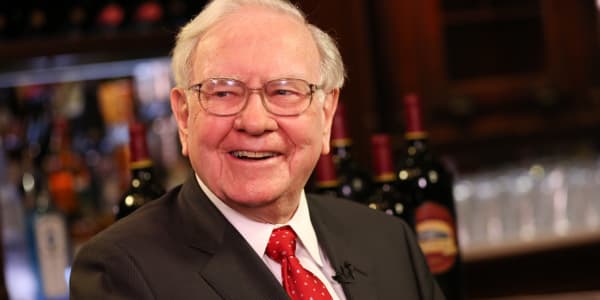While technology companies like Facebook, Netflix and Uber receive plenty of fanfare these days, they're not the only operations making inroads in innovation. In fact, a number of operations in traditional sectors, such as banking, retail and industrial, have adopted technology to help grow their bottom lines.
Here are three stocks that investors may not think of as tech savvy but will ultimately receive a big boost, thanks to technological innovation.
Starbucks (NASDAQ: SBUX)
April 22 was a tough day for Starbucks investors. The night before, the company released its second-quarter results, which saw its revenues come in about $40 million below analyst expectations. Soon after markets opened, the stock fell by 6 percent, and it's down near-10 percent since the earnings.
While the negative news may have affected people's portfolios, it had little impact on the many buy ratings on the stock. Why? Because some analysts think that its mobile app is going to give it a bigger boost in the future.
"They've got the most superior app and loyalty program in the industry," said Peter Saleh, an analyst with BTIG, an Atlanta-based trading firm. "It's driving traffic, average check growth, and they can do even more selling on the app than they do now."
At the moment, its main tech attraction is mobile ordering — customers can buy a cup of java before they even walk into the store. That feature was piloted in December 2014 and has been rolled out in other parts of the world since.
The next step, said Saleh, is delivery service. Through the app, customers will one day be able to order a coffee and have it dropped off at their office or house. The hope is that with new types of food offerings, such as sandwiches and packages goods, people will buy more per purchase than they do now. Starbucks recently rolled out the most significant change in the history of its mobile app-based loyalty program, designed to offer rewards based on spending in absolute dollar terms rather than frequency of single beverage purchases.
While it's hard to break out just exactly how much its app is adding to the bottom line, Saleh points out that companies with innovative mobile products in the restaurant space, such as Domino's and Papa John's, are growing up to four times faster than the rest within the category. He thinks its tech could help the company achieve around 7 percent same-store sales growth, in addition to unit growth, going forward.
Its competitors are also building similar functionality, but Saleh thinks Starbucks is well ahead on the innovation front. "They have an advantage," he said. "The chains will catch up, but they're a couple of years ahead."
The stock closed at $54.88 on Tuesday, but with "significant earnings potential ahead," he said, he thinks it can top $78 over the next year.
General Electric (NYSE: GE)
Most of the news about General Electric these days has centered around its finance divisions — mainly that it's selling them off.
Its quarterly numbers have been just fine, with operating profits down 3 percent in the first quarter and earnings coming in at 21 cents per share, just slightly higher than the 19 cents predicted by analysts. Its stock price is down about 4.5 percent year-to-date.
What often gets lost among the headlines, though, is how this decades old company is innovating and how technology is expected to drive this business forward.
GE currently spends about $5 billion a year on research and development, said Jim Corridore, an analyst with S&P Global Market Intelligence, which is only about 1.7 percent of its market cap, but it's a lot more than most operations spend.
Much of that money is spent on the industrial Internet of things; it creates machines implanted with sensors that can connect to the internet and deliver real-time information about itself.
Many experts think the Internet of Things is the wave of the future, where every device is connected to another device, and it's something GE has already spent big money on.
Its gas turbines, for instance, can relay information to a computer that shows when its parts will need to be replaced. Its medical-imaging products can do the same, displaying how many cycles it's been through and more.
"Almost every product they're making now has some huge technology aspect to it, and that gives them real-time data and analytics," said Corridore. "It's selling these products to customers who need to know how much energy they're using, how much supplies are going to cost, how one product runs versus the other — these are real-time insights."
With the industrial IoT market expected to add $14.2 trillion to the economy by 2030, according to Accenture, there's clearly an opportunity here. GE hasn't said how much it thinks its IoT capabilities will add to the bottom line, but Corridore said it's helping.
"It is moving the dial," he said. "GE comes out with an innovative solution and they win the market."
The stock closed at $29.71 on Tuesday, but Corridore thinks it can top $38 over the next 12 months.
Charles Schwab (NYSE: SCHW)
One sector that's starting to see major tech-related disruption is financials. Consulting firm A.T. Kearny thinks that robo-advisors will have $2 trillion in assets under management by 2020, while big data and cloud computing is making it easier for companies to target new customers.
A new crop of tech companies is operating in the financial space, but at least one old stalwart has a bright future, thanks to tech. Charles Schwab, the 45-year-old San Francisco-based brokerage and banking firm, has always been an innovative business — it was early to the internet banking game in the 1990s — and it's embraced robo-advice in a big way.
"Schwab has always been deeply rooted in tech, and robo-advice platforms are an emerging business focus," said Devin Ryan, a managing director at JMP Securities.
At the moment, Schwab's Intelligent Portfolios platform — the name it's given to its robo-advice offerings — has about $5 billion in assets under management, a small number compared to its $2 trillion in AUM overall. However, that will grow significantly over the next decade, said Ryan. He thinks it could reach $100 billion if not more by 2026.
Beyond robo-advice, the company is also building out big data and analytics capabilities, which will allow it to better understand customers, create products it knows its clients will want, and improve its messaging to potential account holders. It's using tech to automate internal tasks that were previously done manually, too.
Of course, many other financial services companies are adopting technology, but Ryan thinks that Schwab is leading the way.
"They don't just think about the business today but what the business will look like in five or 10 years," he said.
Its stock is down about 15 percent year-to-date — that's mainly due to the Fed cutting back on its promise of four interest-rate hikes, and rate hikes are usually seen as positive for banks, said Ryan — while net revenues, net income and net earnings all increased by double digits in the first quarter.
The stock closed at $27.92 on Tuesday, but Ryan thinks it will hit $34 over the next 12-months.
As it continues to build up its technological capabilities, it should grow even further.
— By Bryan Borzykowski, special to CNBC.com





